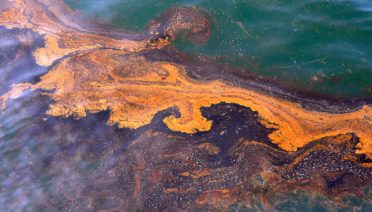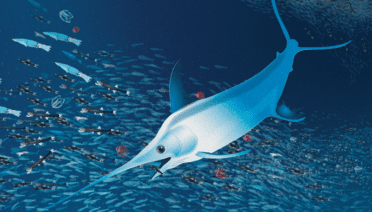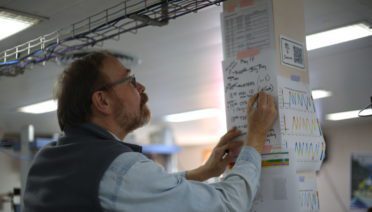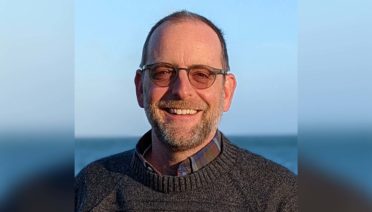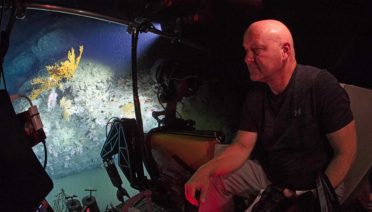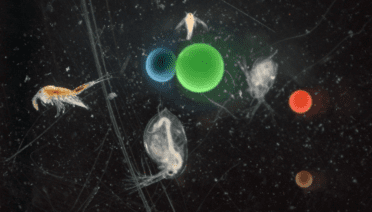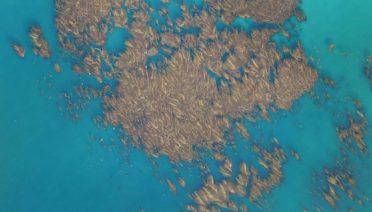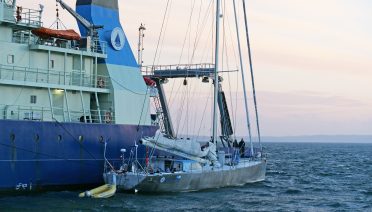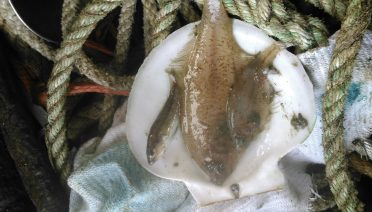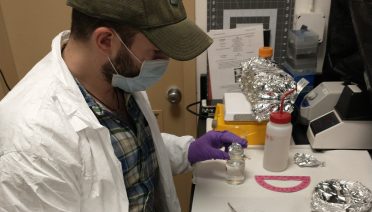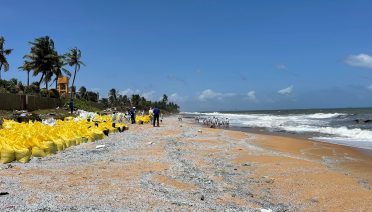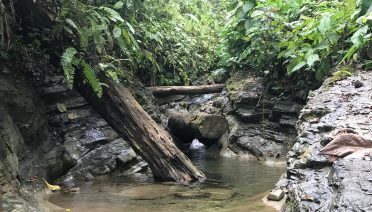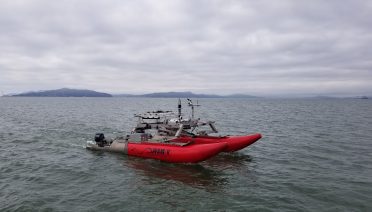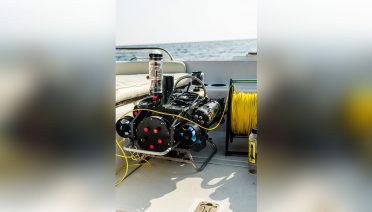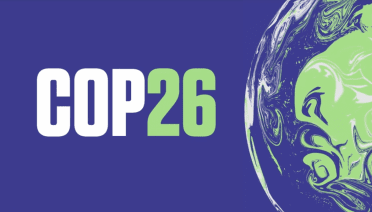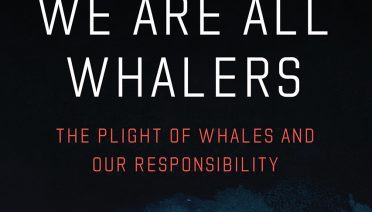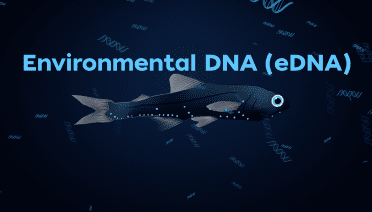Press Room
A team of Woods Hole Oceanographic Institution (WHOI) researchers discovered that nearly 10 percent of the oil floating on the Gulf after the Deepwater Horizon disaster was dissolved into seawater by sunlight – a process called “photo-dissolution”. The findings were published today in the paper “Sunlight-driven dissolution is a major fate of oil at sea” in Science Advances.
A new report from the Woods Hole Oceanographic Institution Ocean Twilight Zone (OTZ) project team offers a detailed look at the climate-altering processes that take place within the zone, in particular those that are driven by animals that migrate between the twilight zone and the surface each night to feed. This phenomenon is likely the biggest migration on Earth—yet it remains incredibly vulnerable to human exploitation.
Dr. Ken Buesseler has been selected as a Geochemistry Fellow by the Geochemical Society and the European Association of Geochemistry.
WHOI senior scientist and Dept. Chair honored for phosphorus and lipid cycling research
Woods Hole Oceanographic Institution has been awarded an Emmy as a co-producer, along with South Florida PBS (WPBT & WXEL) for Changing Seas: “Alvin: Pioneer of the Deep” . The 2021 Suncoast Chapter of the National Academy of Television Arts & Sciences Emmy Awards announced the honor in December, for the category “Environment/Science – Long Form Content.”
The Deep-Ocean Genomes Project is an ambitious effort co-led by WHOI and the University of Connecticut (UConn) to obtain fundamental new knowledge of the organization, evolution, functions, and interactions of life in one of Earth’s least-understood regions: the deep ocean.
A project led by Woods Hole Oceanographic Institution’s Chemical Sensors Lab is moving researchers closer to an in-field microplastics sensor that measures the amount of plastic particles in water.
Woods Hole Oceanographic Institution (WHOI, a global leader in ocean research and exploration, is partnering with two teams selected as finalists in the development of the new Governors Island Climate Solutions Center in New York City. The announcement was recently made by former New York City Mayor Bill de Blasio and The Trust for Governors Island.
The macroalga giant kelp, which is an iconic and important ecosystem-structuring species found off the coast of California and many other coastlines, can grow 100-feet long within 1-2 years. Now, researchers using novel remote sensing observations have found that different factors may bear on the spatial growth dynamics of the Macrocystis pyrifera kelp, which is the largest species of algae in the world.
WHOI and partners join together to launch approximately 100 new Argo floats across the Atlantic Ocean to collect data that supports ocean, weather and climate research and prediction
A study led by Woods Hole Oceanographic Institution scientists is explaining why warm and salty water along with warm water fish species, such as the deep-sea dwelling Gulf Stream flounder and Black Sea bass, were found far inshore in New England in the middle of winter 2017. How did this happen? Researchers say it is due to an intrusion of offshore water from the open ocean onto the Northeast U.S. Shelf, caused by eddies (a circular current of water) and wind.
Woods Hole, MA – Cellulose diacetate (CDA), a bio-based plastic widely used in consumer goods, disintegrates, and degrades in the ocean far quicker than previously assumed, according to a new study published in Environmental Science & Technology Letters. “These findings…
When a fire broke out on the deck of the M/V XPress Pearl cargo ship on May 20, 2021, an estimated 70-75 billion pellets of preproduction plastic material, known as nurdles, spilled into the ocean and along the Sri Lankan coastline. That spill of about 1,500 tons of nurdles, many of which were burnt by the fire, has threatened marine life and poses a complex clean-up challenge. A new peer-reviewed study characterizes how the fire modified the physical and chemical properties of the nurdles and proposes that these properties affected their distribution along the coast.
Woods Hole, MA – Volcanic gases are helping researchers track large-scale movements in Earth’s deep interior. Woods Hole Oceanographic Institution (WHOI) scientists, together with a group of international collaborators, have discovered anomalous geochemical compositions beneath Panama. This interdisciplinary team used…
Woods Hole, MA – The Woods Hole Oceanographic Institution (WHOI) has received $750,000 in funding from the U.S. Department of Energy (DOE) to develop next‐generation autonomous robotic technology for environmental monitoring of marine organisms and the seafloor at potential wind…
A prototype of an autonomous underwater vehicle capable of navigating complex underwater environments and of collecting data adaptively over long periods of time. Daniel Hentz / ©Woods Hole Oceanographic Institution Woods Hole, MA – A grant by the National Science…
Experts from WHOI and Woodwell Climate Research Center are on the ground at COP26 in Glasgow, Scotland, sharing critical perspective on the implications of a warming Arctic
A new book by Michael Moore, veterinarian, and marine scientist at Woods Hole Oceanographic Institution (WHOI), examines the plight and future of the North Atlantic right whale, one of the most critically endangered species on the planet, and draws on Moore’s 40 years of fieldwork to offer possible solutions.
Woods Hole Oceanographic Institution (WHOI), the world’s independent leader in ocean discovery, exploration, and education, has welcomed Dr. Kilaparti Ramakrishna (Rama) as senior advisor to the President and Director on ocean and climate policy.
Woods Hole, MA – The mid-ocean “twilight zone” holds the key to several tantalizing questions about the marine food web and carbon-sequestering capacity of the ocean. But studying this vast and remote area is extremely difficult. Many inhabitants of the…

